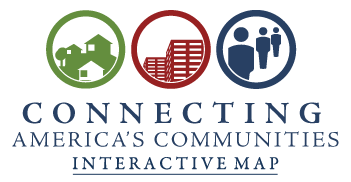BTOP in Action
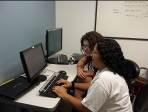
In 2011, Technology for All’s (TFA) Texas Connects Coalition project created or refurbished 71 public computer centers. These centers are a part of a statewide campaign to help those without access to computers and the Internet acquire the digital literacy skills needed to participate in today’s modern workforce.
Using BTOP funds, TFA has been able to make available approximately 350 computers to underserved community members, providing free Internet access to an average of 13,600 users per week. Along with free computer access, the centers provide a variety of resources to help local residents develop technology skills that will make them more competitive in the job market. The centers offer workforce development assistance for resume creation, job searches, and interview preparation. The centers also provide classes covering topics such as computer basics, Internet fundamentals, word processing, and business software, such as Microsoft® Office.
TFA’s job training efforts are already making a huge impact on Texas residents. More than 46,000 students have participated in TFA’s classes. According to TFA, in many communities, residents are using their newly developed computer skills to find and retain jobs. For example, a single parent who was on a fixed income and could not to purchase a computer or broadband service for her home was able to use a TFA center in Houston, Texas, to connect to the Internet. At the center, she developed computer skills, and learned how to update her resume and search online for employment opportunities.
Last updated: April 17, 2012
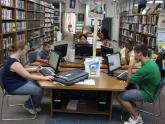
As of July 2011, the Texas State Library & Archives Commission has upgraded public computer centers at 11 libraries throughout the state. Known as the Technology Expertise, Access and Learning for all Texans (TEAL) project, this initiative is providing computer access and training opportunities for the state’s most underserved populations across 38 partnering library systems. BTOP funds already have helped these learning institutions replace 153 existing computers and deploy an additional 163 workstations, connecting an average of 3,500 users per week to online resources.
TEAL also offers professional development webinars for library staff. These webinars provide librarians with tools and techniques to manage and promote computer resources, enabling libraries to better meet patrons’ technology needs. To date, TEAL has facilitated 10 webinars for approximately 744 library staff members, helping them improve their understanding of technology to boost sustainable broadband adoption. TEAL offers webinars on a variety of topics including a series on how to promote and teach computer technology with seniors and people with disabilities. TEAL also partnered with the Texas Workforce Commission to create a series of workforce skills webinars, teaching librarians how to help library patrons with their job searches and career development.
TEAL is using approximately $8 million in BTOP funds and $3.7 million in non-Federal matching funds to provide 2,200 new workstations in 155 new or upgraded public computer centers and directly create more than 100 full- and part-time jobs. As of July 2011, BTOP funds have allowed the Texas State Library & Archives Commission to hire four full-time employees to conduct training workshops and help manage the public computer resources. To see local media coverage, please visit The Smithville Times.
Last Updated: October 18, 2011
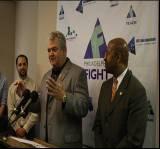
Philadelphia Mayor Michael A. Nutter helped launch the Freedom Rings Partnership at the April 26, 2011, official opening of the FIGHT Computing Center, the first of the project’s 77 public computer centers to provide digital literacy and workforce training opportunities.
FIGHT is one of 13 local agencies working with the city’s Division of Technology to provide broadband Internet access, computers, and training to Philadelphia’s most economically and socially vulnerable populations. The Urban Affairs Coalition, a lead partner in this initiative, will provide computer and technology training opportunities at many computer center locations.
The Freedom Rings Partnership plans to create 177 full-time and part-time jobs. The 77 computer centers will include 19 recreation centers, 29 community-based organization sites working with high-risk populations, 10 homeless shelters, 15 other affordable housing sites, and four mobile labs that will reach communities lacking space or the capacity to house a computer center.
In addition to services provided at citywide computer centers, the Freedom Rings Partnership will encourage Philadelphians to “get connected” to technology in their homes. The participating partners expect to serve approximately 15,000 people per year and use a citywide outreach campaign to deliver information about the importance of broadband technology to more than 100,000 households.
To see local media coverage of the April 26 event, please visit The Philadelphia Inquirer. To read the mayor’s official report about the Recovery Act at work in Philadelphia, please visit here.
Last Updated: October 19, 2011.
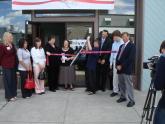
BTOP recipient Tincan celebrated the opening of its new media lab and film production facility on June 8, 2010, in Spokane, Wash. Over 200 people attended the opening ceremony and open house, including mayors from nearby towns and representatives from the offices of U.S. Senators Patty Murray and Maria Cantwell, and others. Many local businesses and vendors also participated. The new space will house the Tincan offices, a 32-computer media lab for training and workshops, and a full professional video production studio. As of October 2010, Tincan had distributed computers and software to Peaceful Valley Community Center, Northeast Community Center, and the Martin Luther King Jr. Outreach Center for public access use. These locations and others will provide access to the Internet for people who do not otherwise have access, and new spaces where Tincan can provide training in Internet skills.
Last Updated: October 18, 2011
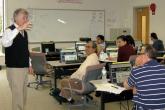
The New Jersey State Library (NJSL), an affiliate of Thomas Edison State College, enrolled more than 6,500 students in more than 2,800 hours of job-readiness computer skills workshops in public libraries across New Jersey. This initiative is designed to help unemployed and underemployed residents acquire the skills needed to find and retain a job. The libraries are providing free access to broadband, workforce development classes, and career advancement tools.
NJSL used BTOP funds to deploy more than 845 new computers at 125 public libraries and upgrade broadband connectivity at 86 public libraries. Along with free access to these workstations, the libraries offer workforce development classes on topics such as computer fundamentals, resume and cover letter techniques, job search fundamentals, and email basics. The libraries also provide free access to career databases and applications that help users explore careers, find and apply for jobs, improve interviewing skills, and track job search progress.
NJSL also provides resources for small business owners and entrepreneurs to foster entrepreneurship, and help existing businesses make lasting and substantial improvements in their performance. At the libraries, community residents can access online business and marketing tools and in-depth market research reports.
In addition to job training classes for residents, NJSL is partnering with the New Jersey Community College Consortium for Workforce and Economic Development to provide professional development workshops and specialized training for library staff members seeking to advance their careers. Librarians learn techniques for managing computer resources, allowing them to better meet their patrons’ technology requests. NJSL has conducted 221 hours of training for its library staff and more than 20 hours of in-person workshops for approximately 100 librarians on how to use career tools and applications that can help library patrons.
Local librarians have seen many of their patrons acquire jobs after taking career building and digital literacy courses. For example, a visitor to the Mount Laurel Public Library lost his job in 2008. He enrolled in the library’s workforce development workshops in 2010 and, using skills he learned in the workshops, was able to find a new job online. A resident of Garfield, N.J., also took a computer course at the Garfield Public Library, acquiring computer skills that she needed to obtain a part-time position as a Product Demonstrator. Libraries across the state are seeing similar successes of how broadband can improve a person’s economic situation.
Last updated: April 17, 2012.
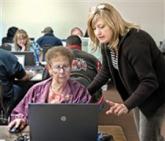
The Toledo Telephone Company, in partnership with the Cowlitz Indian Tribe, has helped more than 300 community members learn basic computer functionality, Internet, and email skills through intensive classes. Upon successful completion of the course, participants also receive a laptop and two years of free broadband service.
Based on the success of the initial program, Toledo Telephone Company expanded their course offerings to include an auxiliary course to 40 additional participants each month. The auxiliary course’s curriculum covers a wide variety of topics, including Microsoft ® Office productivity software. When several senior citizen community members expressed an interested in learning how to share digital photos, Toledo Telephone Company also developed an Adobe ® Photoshop course.
All of these classes are part of a countywide initiative to increase broadband adoption through computer equipment and digital literacy education relevant to the Lewis County community and Cowlitz tribal members. Some community members that have successfully completed the course have implemented their computer knowledge in the workplace. One participant, who previously hand wrote her column for a local Toledo newspaper, now composes her article using her laptop and submits by email.
Last Updated: December 7, 2011
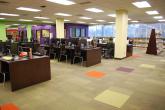
On December 5, 2011, Toledo-Lucas County Public Library reopened a newly renovated public computer center. The renovation of the Kent Branch @ccess Center included upgrading 109 computers, increasing broadband speeds and enhancing career-building resources. Since the opening, the center now offers free workforce development workshops and mentoring sessions to help individuals acquire the skills needed to find and retain jobs.
The @ccess Center has been able to acquire SMART® Board interactive whiteboards, build a new research lab for group collaboration, and offer classes to help visitors become more competitive in today’s digital job market. The whiteboards allow instructors and students to digitally write on the board and interact with digital training materials. The center offers a wide variety of classes to help visitors develop digital literacy and workforce skills, including classes in computer basics, Internet fundamentals, and productivity software, such as Microsoft® Office, resume creation and interview preparation.
The @ccess Center is also providing classes on how to find and apply for jobs online since many Toledo-Lucas County businesses in Toledo-Lucas County are recruiting online. The @ccess Center provides workshops and individual assistance with job searching, email basics, and online applications. The center has already helped many of its visitors apply and interview for jobs at local manufacturing plants, as well as a newly opened casino, since each of these businesses has moved their hiring practices online
The library’s ultimate goal is to help Toledo-Lucas County residents improve their lives through computer resources and educational opportunities. In addition to the @ccess Center, the library funded the Cybermobile, a state-of-the-art mobile technology center complete with broadband Internet access. Funded by BTOP, this “classroom on wheels” is equipped with 12 desktop computers and provides broadband and digital literacy training to residents who are unable to commute to the @ccess Center.
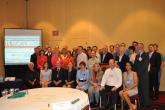
In March 2011, the University Corporation for Advanced Internet Development (UCAID), also known as Internet2, began upgrading its advanced middle-mile backbone network in support of the United States Unified Community Anchor Network (U.S. UCAN) project. Extending across 50 states, this upgraded network will enable high-speed broadband connectivity for up to 121,000 additional community anchor institutions. The project is a large-scale, public-private partnership that will interconnect more than 30 existing research and education networks, creating a dedicated fiber-optic backbone that will enable advanced broadband capabilities such as video multicasting, telemedicine, distance learning, and other life-changing Internet-based applications. UCAID’s BTOP-funded fiber-optic network will also offer more than 8.8 TBps of capacity.
As of July 2011, UCAID has upgraded and activated more than 4,828 miles of its proposed 16,312 mile fiber network. In addition, UCAID anticipates the first coast-to-coast links, from New York City to Sunnyvale, Calif., to be installed and operational this summer with the entire network expected to be completed by early 2013.
In addition to the network infrastructure, UCAID also initiated outreach and awareness-building activities to demonstrate how advanced broadband applications and services could be deployed throughout the United States. In April 2011, UCAID hosted an annual two-day conference meeting in Arlington, VA, where more than 65 members attended to receive a status update on the project’s construction efforts and learned about the new services the organization will provide through the advanced network.
Last Updated: October 18, 2011
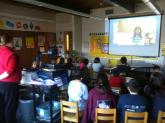
The University of Alaska Fairbanks is breaking down the digital divide in remote villages across the state, using a three-prong approach to increase sustainable broadband adoption. Through the Bridging the E-Skills Gap project, the university is partnering with 21 non-profit, educational, and for-profit organizations to create distance learning, public safety, and telehealth opportunities.
For example, the Alaska Library Network, a non-profit organization created to administer and coordinate programs and services across Alaskan libraries, provides free access to two new distance learning tools at libraries throughout the state. The first, Live Homework Help, is an online educational portal that offers live homework tutors to K-12 students seven days a week. Students can get help on a variety of subjects, including math, science, English, and social studies. The second, the Testing Educational Reference Center, is an online resource where patrons can access study guides, practice tests, and tutoring videos for school entrance and career certification exams. Library visitors can use the tool to prepare for tests, such as GED, SAT, and the Reciprocal Electrician Journeyman License exam. As of December 2011, these tools were already used for approximately 1,200 training sessions.
Another project partner, the Family Centered Services of Alaska, installed two video conference centers in Fairbanks to provide distance learning classes, professional development workshops, and even family therapy sessions to low-income families. The Alaska Postsecondary Commission is in the process of creating the College and Career Guide, an online portal that allows students to develop career plans, research and apply to colleges and postsecondary institutions, and find scholarships and other financial aid. Yet another project partner, the Alaska Native Tribal Consortium, offers a Telehealth Coordinator Certification Program for medical professionals. This three-course program helps individuals become certified workers skilled in the use and application of telehealth applications and videoconferencing equipment.
The University of Alaska’s ultimate goal is to provide broadband training to as many as 7,400 residents, both old and young. To reach the region’s youngest and most remote residents, the university created the Digital Storytelling–Performance Literacy program, a unique workshop where K-12 students learn how to digitally write and tell their own culturally relevant stories. Participants learn podcast basics, Microsoft ® PowerPoint fundamentals, and oral presentation skills. At the end of the class, students create and perform their own personal stories. As of December 2011, 71 students have participated in the program, telling stories on a wide variety of subjects, including Tlingit customs, native Alaskan animals, and family ancestry.
Last Updated: December 23, 2011
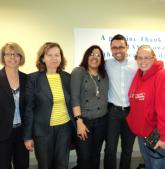
With the support of BTOP funds, the University of Massachusetts Lowell has already held digital literacy and workforce development classes for more than 4,000 people. These classes are created to boost sustainable broadband adoption among low-income youth, the unemployed, adults without college degrees, and senior citizens. The university conducts this training at nine partner sites across the Lowell and Merrimack Valley regions and provides courses on topics such as computer basics, digital media production, and job readiness.
For example, at the Amesbury, Lawrence, and Salisbury senior centers, the university conducts basic computer skills classes, teaching residents Internet fundamentals. At the United Teen Equality Center, young adult trainers provide video game development and digital media editing classes, preparing teenagers for possible careers in broadcasting or Internet entrepreneurship. The university is also partnering with Community Teamwork Inc., a non-profit organization that helps low-income individuals become self-sufficient, to integrate digital literacy training into its Job Readiness Program. This five-week program helps unemployed participants re-enter the workforce, teaching them interview skills, resume writing techniques, email tips, and Microsoft® Office software.
In addition, the university has opened nine public computer centers, providing visitors free access to more than 48 workstations. BTOP funding has also allowed the university to hire nine computer trainers and offer some of its digital literacy classes in both English and Spanish.
Last updated: January 10, 2012














